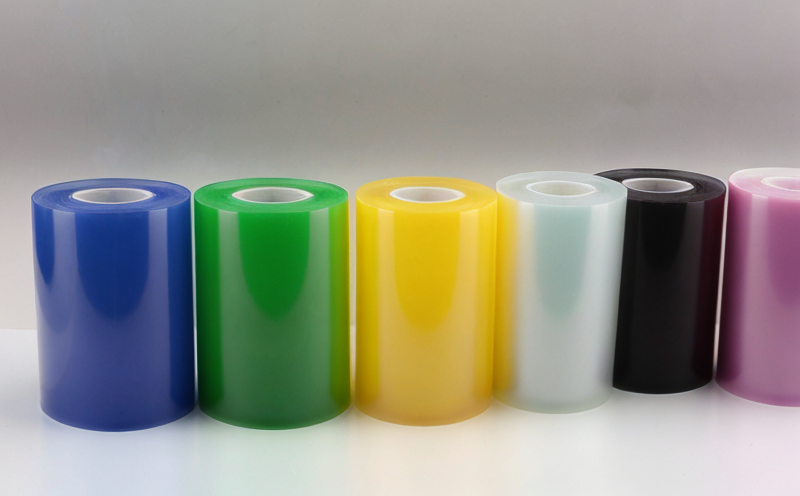JIS K 7361 Barrier Property Testing of Plastic Films
The JIS K 7361 test standard is an essential procedure used to evaluate the barrier properties of plastic films, particularly focusing on their ability to prevent the transmission of gases. This test is critical for quality managers, compliance officers, and R&D engineers who need to ensure that packaging materials meet specific performance requirements in terms of gas permeability.
The JIS K 7361 method involves a series of tests designed to measure how effectively plastic films can block the passage of gases such as oxygen, nitrogen, carbon dioxide, and water vapor. These properties are crucial for maintaining product integrity during storage and transportation, ensuring that packaged goods remain fresh and free from contamination.
The test setup typically includes a sample chamber where the film specimens are placed between two plates with controlled atmospheres on either side. The permeation of gases through the film is measured over time using mass spectrometry or other suitable analytical techniques. This allows for accurate determination of gas transmission rates, which are then compared against specified limits set by industry standards.
Understanding the barrier properties of plastic films is vital not only from a technical standpoint but also because it directly impacts customer satisfaction and loyalty. For instance, poor gas barrier performance can lead to spoiled food products or premature degradation of pharmaceuticals inside their packaging, resulting in significant financial losses for manufacturers and distributors.
In addition to its role in maintaining product quality, the JIS K 7361 test plays a critical part in ensuring environmental compliance. By selecting films with optimal barrier properties, companies can reduce waste by extending shelf life and minimizing the need for frequent replacements of packaging materials. This contributes positively towards sustainable practices within the industry.
Let’s delve deeper into some key aspects of this testing procedure:
- Sample Preparation: Specimens must be cut according to precise dimensions provided by JIS K 7361. It is important that samples are free from defects such as scratches or folds, which could affect the accuracy of gas transmission measurements.
- Instrumentation: High-precision equipment like mass spectrometers and gas permeameters are used to monitor changes in atmospheric composition across the film sample. Modern instruments provide real-time data that helps researchers identify trends more quickly.
- Data Analysis: After collection, raw data is processed using advanced statistical methods to derive meaningful insights about the barrier performance of different films. This information aids manufacturers in making informed decisions regarding material selection and process optimization.
This comprehensive approach ensures that every aspect of the plastic film's structure contributes optimally towards achieving desired gas barrier characteristics. As a result, products packaged with these materials maintain their freshness and safety throughout distribution networks, enhancing overall consumer trust.
Why Choose This Test
Selecting the JIS K 7361 test for plastic film barrier property evaluation offers numerous advantages over other testing methodologies. Firstly, it aligns perfectly with international standards recognized worldwide, providing consistent and reliable results across various industries.
The precision offered by this method allows manufacturers to fine-tune their production processes, ensuring that each batch of product meets stringent quality benchmarks set forth by regulatory bodies globally. This consistency translates directly into improved reputation among consumers and stakeholders alike.
Moreover, choosing JIS K 7361 testing enhances operational efficiency within facilities by streamlining the verification process for new materials or modifications to existing formulations. By leveraging this standardized procedure early in development stages, organizations can identify potential issues before committing substantial resources towards full-scale production runs.
Customer Impact and Satisfaction
The implementation of JIS K 7361 testing significantly impacts customer satisfaction by addressing two primary concerns: product quality and environmental sustainability. When packaging materials exhibit superior barrier properties, they help preserve the freshness and integrity of contained products.
For instance, in food packaging applications, maintaining optimal oxygen levels prevents oxidation processes that cause spoilage. Similarly, effective moisture barriers protect sensitive items like electronics from damage due to humidity exposure. These factors contribute directly to longer shelf lives and better overall product performance, ultimately leading to higher customer satisfaction rates.
From an environmental perspective, improved barrier properties reduce the necessity for frequent repackaging or early disposal of products. This extends the useful life cycle of packaging materials while minimizing waste generation, thus promoting more sustainable practices throughout supply chains.
Environmental and Sustainability Contributions
The JIS K 7361 test contributes positively to environmental conservation efforts by encouraging the use of eco-friendly packaging solutions. By identifying films with excellent barrier properties, industries can reduce their carbon footprint significantly.
For example, less frequent repackaging due to better gas and moisture control translates into lower energy consumption during transport and storage processes. Additionally, extending product shelf life means fewer resources are required for manufacturing new items prematurely discarded because of spoilage or damage.
The use of recyclable materials in conjunction with effective barrier properties further enhances sustainability goals. Manufacturers can design packages that not only perform well but also contribute positively to recycling initiatives, fostering circular economy practices within the industry.





